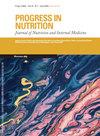新冠肺炎疫情期间大学生的营养途径
4区 医学
Q4 Agricultural and Biological Sciences
引用次数: 0
摘要
研究目的:本研究的目的是调查COVID-19大流行期间大学生的营养方法。方法:共579名大学生(男296人,女283人)参与研究。除了个人表格,学生们还填写了一份营养方法测试问卷。学生们自愿参加。这些调查是在社交媒体上进行的。采用独立样本t和单因素方差分析(ANOVA)分析组间差异。结果:宵禁(封锁)日和无禁止、限制日营养评分无性别差异(p < 0.05)。在宵禁和没有禁止或限制的日子里,学生的营养得分根据他们的感觉有显著差异(p<0.05)。不同院系学生在宵禁日与不禁止或限制日的得分差异有统计学意义(p<0.05)。结论:在新冠肺炎疫情期间,大学生的营养习惯在禁止性与非禁止性的情况下没有性别差异。虽然大学生的营养习惯在性别上是相似的,但研究发现,他们的营养习惯会根据教师的类型而变化。接受健康教育的师范生营养习惯较好。那些感觉不好的人营养得分较低。在新冠肺炎疫情期间,无论是否有宵禁、禁令,还是没有禁令的日子,都建议为学生提供营养支持的心理援助。本文章由计算机程序翻译,如有差异,请以英文原文为准。
Nutritional Approaches of University Students during the COVID-19 Pandemic
Study Objectives: The aim of this study was to investigate nutritional approaches in university students during the COVID-19 pandemic. Methods: A total of 579 university students (male: 296, female: 283) participated in the study. Besides the personal form, the students filled out a nutrition approach testing questionnaire. Students participated voluntarily. The surveys were conducted on social media. Independent sample t and one-way analysis of variance (ANOVA) were applied to analyze the difference in groups. Results: Nutrition scores on the days of curfew (Lockdown) and the days when there is no prohibition or restriction did not change according to gender (p>0.05). A significant difference was found in the nutrition scores of the students according to the levels they felt on the days when there was a curfew and, on the days, when there was no prohibition or restriction (p<0.05). A significant difference was found between the scores of the students of different faculties on the days when there was a curfew and, on the days, when there was no prohibition or restriction (p<0.05). Conclusion: It has been determined that the nutritional habits of university students do not change according to gender in the event of prohibition and restriction or not during the coronavirus epidemic. While the nutritional habits of university students were similar according to gender, it was found that they changed according to the type of faculty. The nutritional habits of the faculty students who received education on health were found to be better. Those who feel bad have lower nutritional scores. During the coronavirus epidemic, it is recommended to provide psychological assistance to students in support of nutrition, whether there are curfews, bans, or days when there is no ban.
求助全文
通过发布文献求助,成功后即可免费获取论文全文。
去求助
来源期刊

Progress in Nutrition
医学-营养学
CiteScore
1.40
自引率
0.00%
发文量
0
审稿时长
>12 weeks
期刊介绍:
Progress in Nutrition was founded in 1999 as an independent magazine, a multidisciplinary approach, dedicated to issues of nutrition and metabolism.
 求助内容:
求助内容: 应助结果提醒方式:
应助结果提醒方式:


